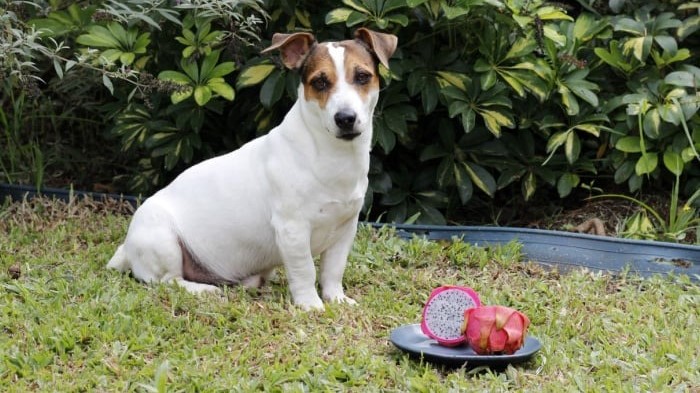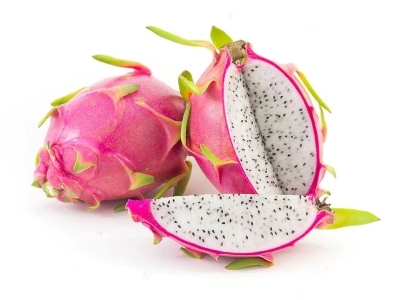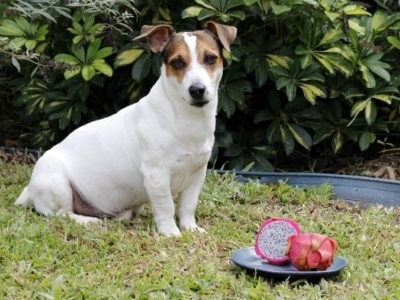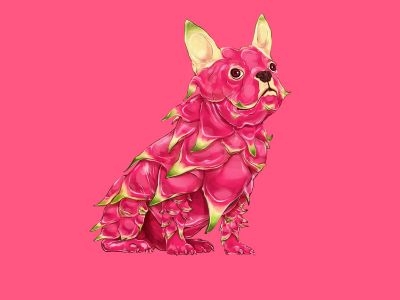When it comes to our furry companions, ensuring their health and well-being is a top priority.

Our dogs often share our meals, and it’s natural to wonder if certain human foods are safe for them to eat. One such exotic fruit that might catch your attention is dragon fruit.
Known for its vibrant colors and unique appearance, dragon fruit is not only appealing to humans but also raises questions about its safety for dogs.
In this article, we’ll dive deep into the world of dragon fruit and explore whether it’s a suitable treat for your canine friend.
Contents
Understanding Dragon Fruit
Dragon fruit is a tropical fruit derived from numerous cactus species native to the Americas.

Its unusual look, with bright pink or yellow skin and speckled meat loaded with tiny black seeds, has made it an eye-catching addition to a variety of meals.
The fruit’s popularity has increased as a result of its reputation as a human superfood, providing a variety of vitamins, minerals, and antioxidants.
Is Dragon Fruit Safe for Dogs?
The good news is that dragon fruit is not toxic to dogs and can be eaten in moderation as an occasional treat.

According to the American Society for the Prevention of Cruelty to Animals (ASPCA), dragon fruit is not listed among the foods that are harmful to dogs.
This does not mean that you may give your dog a limitless amount of dragon fruit or any other fruit.
Too much of anything can lead to digestive issues, including diarrhea, vomiting, or gas.
As a result, while feeding your dog dragon fruit or any other new food, it is important to follow basic instructions.
What Are the Benefits of Dragon Fruit for Dogs?
Dragon fruit has several health benefits for Dogs.
Here are some health benefits, such as:
Vitamins and Minerals
Dragon fruit contains several vitamins and minerals that could be beneficial for dogs:
Vitamin C
This vitamin is an antioxidant and can help support the immune system[1].
However, dogs can synthesize their own Vitamin C, so they might not need additional supplementation from foods like dragon fruit.
Vitamin B
Dragon fruit contains some B vitamins, which play roles in energy metabolism, nerve function, and more.
B vitamins are also typically present in balanced dog foods.
Minerals
Iron is essential for oxygen transport in the blood, and magnesium plays a role in muscle and nerve function.
While these minerals are important, dogs usually get them from their regular diets.

Hydration
Dragon fruit has a high water content, which could contribute to your dog’s hydration, especially during hot weather or after physical activity.
While offering water–rich foods can be beneficial, it’s still crucial to provide your dog with access to fresh water at all times.
Fiber
The dietary fiber in dragon fruit might aid in digestion and help regulate bowel movements.
Fiber can be particularly useful for dogs prone to constipation. However, too much fiber can lead to loose stools or gastrointestinal upset[2].
Gradually introduce small amounts of dragon fruit and monitor your dog’s response.
Low in Calories
Dragon fruit is relatively low in calories compared to some other fruits.
For dogs that need to watch their weight or for those on a weight loss program, offering small amounts of low–calorie treats like dragon fruit can be a way to provide a snack without significantly impacting their caloric intake.
Antioxidants
Dragon fruit contains antioxidants, which are compounds that help protect cells from damage caused by free radicals.
Antioxidants can contribute to overall health and may have anti–inflammatory effects.
However, the specific impact of these antioxidants on dogs‘ health is not well-researched, and dogs have different antioxidant needs compared to humans.
What Are the Risks and Considerations of Dragon Fruit for Dogs?
Feeding dragon fruit to dogs comes with certain risks and considerations that every dog owner should be aware of.
While dragon fruit can have potential benefits, it’s important to approach it cautiously and with an understanding of how it may affect your dog’s health[3].
Here are some risks and considerations:
Digestive Upset
Introducing new foods, including dragon fruit, into a dog’s diet can lead to digestive upset.

The high fiber content of dragon fruit could potentially cause diarrhea or other gastrointestinal issues, especially if your dog isn’t accustomed to consuming fiber-rich foods[4].
Allergies and Sensitivities
Dogs, like humans, can have allergies or sensitivities to certain foods.

While dragon fruit is not commonly known as an allergenic food, there’s still a possibility that your dog could have an adverse reaction.
Watch for signs of itching, swelling, vomiting, diarrhea, or other signs of discomfort.
Sugar Content
Dragon fruit contains natural sugars.

While these sugars are generally considered safe in small amounts, too much sugar can lead to weight gain, dental issues, and an increased risk of diabetes in dogs.
Choking Hazard
Dragon fruit may contain seeds, which could pose a choking hazard for dogs.

Make sure to remove all seeds before giving dragon fruit to your dog.
Pesticides and Chemicals
Always make sure that any fruit you give your dog has been carefully washed and is free of pesticides or chemicals.

Organic dragon fruit is preferred to reduce the danger of exposure to potentially toxic elements.
Moderation
Even though dragon fruit may offer some potential benefits, it should only be given to dogs in moderation and as an occasional treat.
It should never replace well–balanced and nutritionally complete dog food.
Nutritional Imbalance
While dragon fruit contains certain vitamins and minerals, dogs have unique nutritional requirements that might not be fully met by fruits or vegetables alone.
Relying too heavily on non-standard foods can lead to nutritional imbalances over time.
Consult a Veterinarian
Before introducing any new food into your dog’s diet, including dragon fruit, it’s crucial to consult with a veterinarian.
They can provide personalized advice based on your dog’s age, breed, size, health status, and dietary needs.
Focus on Dog-Safe Treats
If you’re looking to give your dog treats that provide benefits beyond standard dog food, consider options specifically designed for dogs.
These treats are formulated to be safe and nutritionally appropriate for dogs.
Individual Variability
Dogs are unique individuals, and what works well for one dog may not work well for another.
Pay attention to how your dog reacts to any new food and be prepared to make adjustments based on their individual response.
How to Introduce Dragon Fruit to Your Dog
Introducing new foods to your dog’s diet should be done carefully to minimize the risk of digestive upset or adverse reactions.
If you’re interested in offering dragon fruit to your dog, follow these steps to introduce it safely:
- Choose a Ripe Dragon Fruit
Choose a mature dragon fruit that is firm, bright in color, and free of spoilage, mold, or injury.
- Clean and Prepare the Fruit
Wash the dragon fruit carefully to get rid of any dirt, chemicals, or pesticides. To see the flesh inside, peel off the skin.
The peel of dragon fruit is difficult to digest and may upset the stomach.

- Remove Seeds
Dragon fruit contains small, black seeds that could pose a choking hazard for your dog.
Remove all the seeds from the fruit before offering it to your dog.
- Cut into Small Pieces
According to the size of your dog, cut the dragon fruit into bite–sized pieces.
Your dog can chew and digest smaller bits more easily.
- Offer a Small Amount
Start by offering a very small piece of dragon fruit as a treat.
This will help you gauge your dog’s reaction and ensure they tolerate it well.
- Monitor Digestive Health
Pay attention to your dog’s stool consistency and frequency over the next day.
Any major changes in digestion could indicate that the dragon fruit isn’t agreeing with your dog.
- Moderation is Key
Dragon fruit should be given in moderation. It’s not a replacement for your dog’s regular meals.
The high fiber content in dragon fruit can cause digestive upset if given excessively.
- Consult Your Veterinarian
Before introducing dragon fruit or any new food to your dog’s diet, consult your veterinarian.
They can provide guidance based on your dog’s specific health needs and dietary requirements.
- Rotate Fruits
Instead of focusing solely on dragon fruit, consider rotating different dog-safe fruits in your dog’s diet.
Variety can provide a wider range of nutrients.
- Be Prepared to Stop
If you notice any adverse reactions in your dog, such as an upset stomach, diarrhea, vomiting, or signs of discomfort, stop feeding dragon fruit immediately and consult your veterinarian.
- Regular Vet Check-ups
Keep up with regular veterinary checkups for your dog.
Discuss any changes in diet or concerns about your dog’s health with your veterinarian.
How Much Dragon Fruit Can Dogs Eat?
As a general rule of thumb, fruits should make up no more than 10% of your dog’s daily calorie intake.

This means that for an average 30-pound dog, one or two pieces of dragon fruit per day should be enough.
For smaller or larger dogs, adjust the amount accordingly. Remember that dragon fruit is high in sugar and fiber, which can affect your dog’s blood sugar levels and bowel movements.
Therefore, it is best to feed your dog dragon fruit sparingly and not every day.
When to Avoid Feeding Dragon Fruit to Dogs
While dragon fruit can be safe in moderation for some dogs, there are instances where it’s best to steer clear of this fruit:
- Allergies or Sensitivities
- Digestive Issues
- Diabetes
- Overweight or Weight Management
- Puppies
- Older Dogs
- Underlying Health Conditions
- Medications
- Choking Hazard
- Excessive Consumption
If you’re uncertain whether dragon fruit is suitable for your dog due to specific health concerns or conditions, consult your veterinarian before feeding it to your dog.
FAQs
Is dragon fruit safe for all dogs?
Dragon fruit can be safe for many dogs, but individual sensitivities vary. Consult your veterinarian before introducing new foods, especially if your dog has allergies, digestive issues, or health concerns.
Are dragon fruit seeds safe for dogs?
Dragon fruit seeds are not toxic, but they can pose a choking hazard, particularly for small dogs. It’s recommended to remove the seeds before offering the fruit to your dog.
Is dragon fruit a good treat for diabetic dogs?
Due to its natural sugar content, dragon fruit might not be suitable for diabetic dogs. Consult your vet before offering it to dogs with diabetes.
How do I know if my dog is allergic to dragon fruit?
Watch for signs of allergies, such as itching, redness, swelling, or gastrointestinal upset. If you notice any of these symptoms, discontinue feeding dragon fruit and consult your veterinarian.
Can dragon fruit replace a regular meal for my dog?
No, dragon fruit should not replace a balanced dog food diet. It can be offered as an occasional treat but should not substitute for proper nutrition.
Conclusion
Dragon fruit is a safe and healthy treat for dogs if fed in moderation and prepared properly.
It can provide your dog with some vitamins, minerals, antioxidants, and fiber that can benefit their overall health.
However, it is not a substitute for a balanced diet and should not be given too often or too much.
Always consult your veterinarian before introducing any new food to your dog’s diet and monitor their reaction carefully.
I hope this blog helps you understand more about dragon fruit for dogs.
Thank you for reading! 😊
Reference:
- Development of dog immune system | NIH
- What to do if your dog has an upset stomach | WebMD
- Routine health care of dogs | MSD Veterinary Manual
- What Is Fiber and Why Does Your Dog Need it in Their Diet? | American Kennel Club

Dania is a dog groomer living in California, who loves styling dogs. She often uses dog accessories to keep them distracted while grooming. She is also a dog parent to a Pomeranian, Duke. It’s because of him she is always on a lookout for the best dog foods, toys, other dog accessories, and ways to keep him equipped, healthy and happy.


